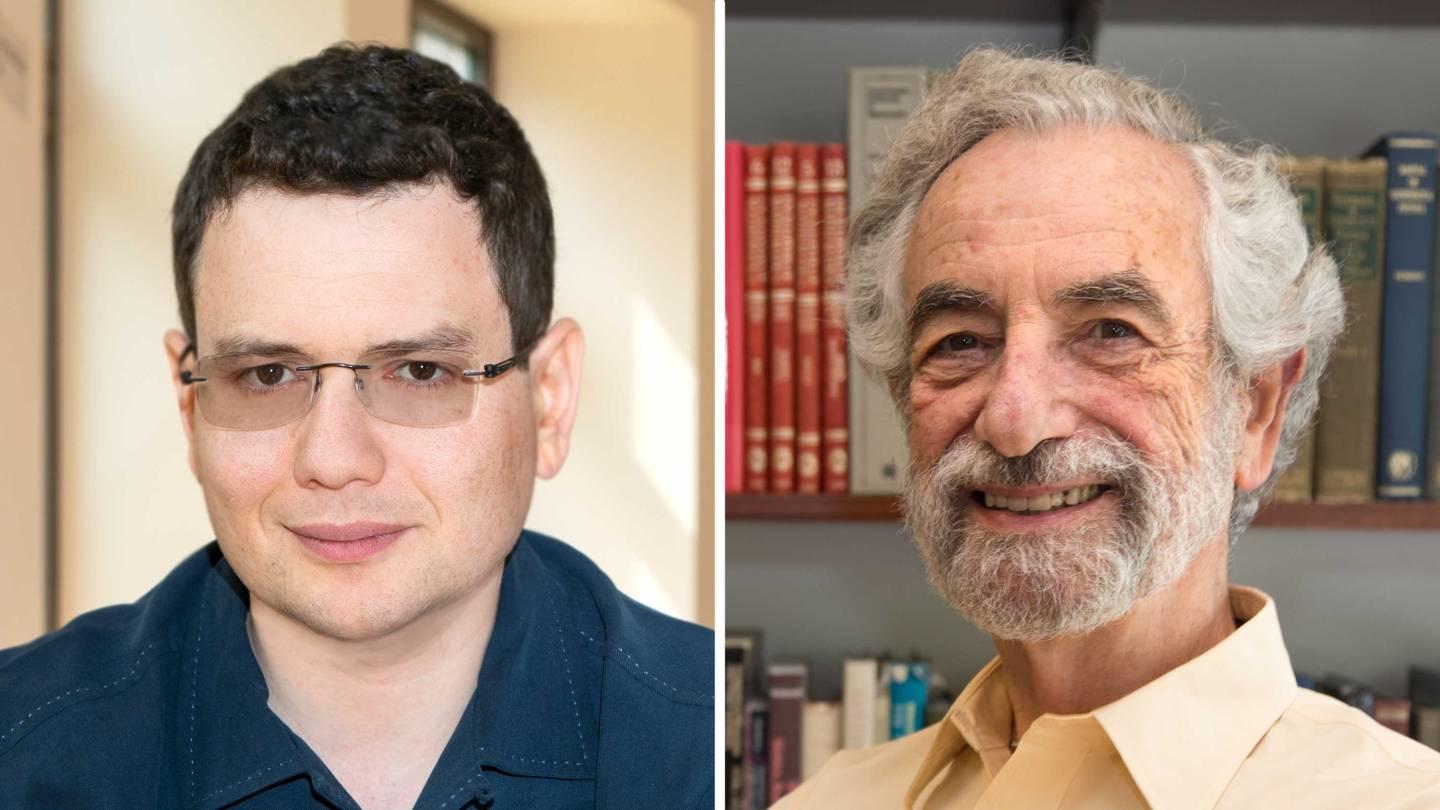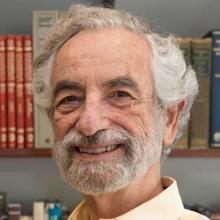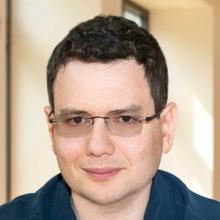Braverman and Lieb win international mathematics prizes for cross-discipline work

Princeton professors Elliott Lieb and Mark Braverman were among those honored today for significant contributions to mathematics and affiliated fields by the International Mathematical Union (IMU) in Helsinki, Finland.
Lieb, the Eugene Higgins Professor of Physics, Emeritus, and Professor of Mathematical Physics, Emeritus, was awarded the Carl Friedrich Gauss Prize for “deep mathematical contributions of exceptional breadth which have shaped the fields of quantum mechanics, statistical mechanics, computational chemistry and quantum information theory.”
Braverman, a professor of computer science, was awarded the Abacus Medal for “his path-breaking research developing the theory of information complexity, a framework for using information theory to reason about communication protocols.”
The awards were announced during the same ceremony in which Princeton mathematics professor June Huh was awarded the Fields Medal, often referred to as the “Nobel Prize of mathematics.”

Wide-ranging applications
The Gauss prize that Lieb received, named for the German mathematician and physicist and awarded jointly by the German Mathematical Union (DMV), recognizes outstanding mathematical contributions that have found significant applications outside the field. Lieb was honored for contributions to physics, chemistry and pure mathematics.
“Reminiscent of Gauss and other 18th and 19th century giants, Elliott H. Lieb, driven by problems in and applications to physics, has unraveled elegant and fundamental mathematical structures, vastly transcending the original motivations,” the IMU citation said. “In doing so, Lieb has introduced concepts which have shaped whole fields of research in mathematics even beyond his original area, while having a transformative impact on physics and chemistry.”
At the award ceremony, the audience watched a video in which Lieb discussed his career and summarized his research.
“Elliott Lieb is a leading figure in mathematical physics of the last 70 years,” said Igor Rodnianski, professor and chair of the Department of Mathematics, Lieb’s home department. “His profound and lasting influence has changed and in some cases redefined multiple branches of mathematical physics, including quantum mechanics, statistical physics, computational chemistry and others.
“Along with his impact on mathematical physics, analysis and algebra, Elliott Lieb directly and indirectly influenced, shaped and guided several generations of mathematical physicists. We congratulate Elliott on this very deserved award,” Rodnianski said.
“Elliott is a legend,” said Herman Verlinde, chair of the Department of Physics. “Throughout his long career, Elliott had the unique ability to ask fundamental questions about general physical systems and find beautiful exact results about them, often long before it was generally recognized that these questions were important.
“While thinking about physical problems, he uncovered rich and unexpected new mathematical structures, and his rigorous mathematical results have deeply impacted all parts of theoretical science, including the most recent developments in condensed matter physics, quantum information science, statistical mechanics and quantum chemistry. It is a true privilege to have him as a colleague,” said Verlinde, who is also the Class of 1909 Professor of Physics.
Lieb said it was surprise and a pleasure to receive the Gauss award. In November he received the Medal of the Erwin Schrödinger Institute for Mathematics and Physics, and in January received the APS Medal for Exceptional Achievement in Research from the American Physical Society.
Originally wanting to become an electrical engineer, Lieb decided to pursue physics in his first year as an undergraduate at the Massachusetts Institute of Technology. He graduated in 1953. Three years later, he received his Ph.D. in mathematical physics from the University of Birmingham in the United Kingdom.
His career took him to IBM, where he met young colleagues who wanted to approach physics “with a mathematical slant.” He moved on to several universities, including Northeastern and MIT, and came to Princeton in 1975, ultimately transferring to emeritus status in 2017 but continuing his work.
“I’m working on a paper right now,” he said.
Award for information science

Braverman is the first recipient of the Abacus Medal, which honors distinguished achievements in mathematical aspects of information science. The Abacus honor is a continuation of the Rolf Nevanlinna Prize that was awarded from 1982 to 2018.
“Mark Braverman led the development of the theory of information complexity, the interactive analog of Shannon’s information theory,” his citation said. “In addition to his work on information complexity, Braverman has made contributions to diverse areas at the interface of theoretical computer science and mathematical sciences.”
Braverman, whose work focuses on theoretical computer science and its connections to other disciplines, said the Abacus Medal was a great honor for himself and his research group. He added that it’s “a great responsibility to the field going forward.”
The IMU played a video profiling Braverman in which his children are featured illustrating the principles of some of his work.
Braverman was born in Russia when it was part of the Soviet Union. His family moved to Israel and then to Canada. He received a bachelor of arts in mathematics and computer science from the Technion (the Israel Institute of Technology) in 2001. He received his Ph.D. in computer science from the University of Toronto in 2008. After spending two years as a postdoctoral researcher at the Microsoft Research New England laboratory and a year on the faculty of the University of Toronto, he joined the Princeton faculty in 2011 and was promoted to full professor in 2015.
“Mark’s list of accomplishments is astonishing,” said Jennifer Rexford, chair of the Department of Computer Science, noting the many honors Braverman has received since winning a Math Olympiad gold medal at age 16.
“Our modern networked lives rely on communication protocols that allow multiple computers to work together to compute answers to important questions,” Rexford said. “Mark’s ingenious research lays foundations for understanding how multiple parties can cooperate efficiently — minimizing the amount of information they need to share to complete their task.”
Rexford, who is also the Gordon Y.S. Wu Professor in Engineering and a professor of computer science, noted that Princeton’s computer science department has a long history of foundational research in computing. “With the growing role of computer science in every discipline and every human endeavor, pushing the frontiers of the field is more important than ever,” she said.
Liz Fuller-Wright contributed to this story.
